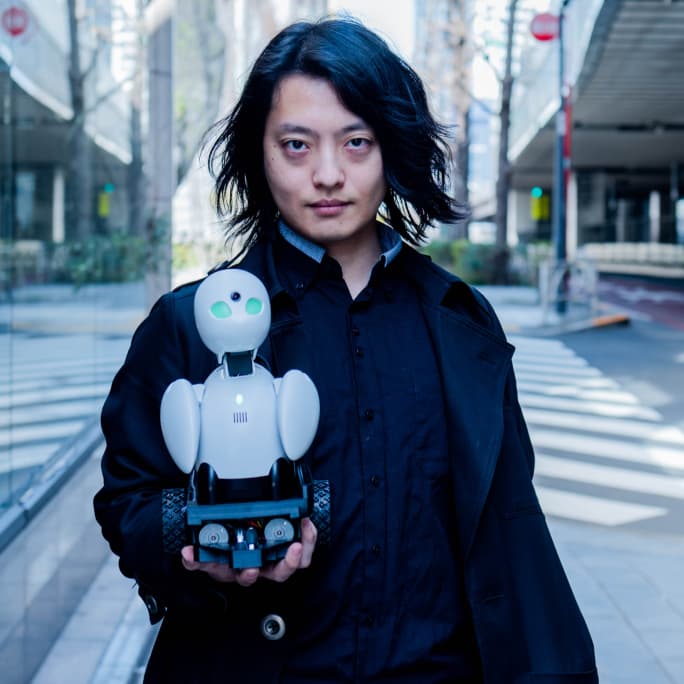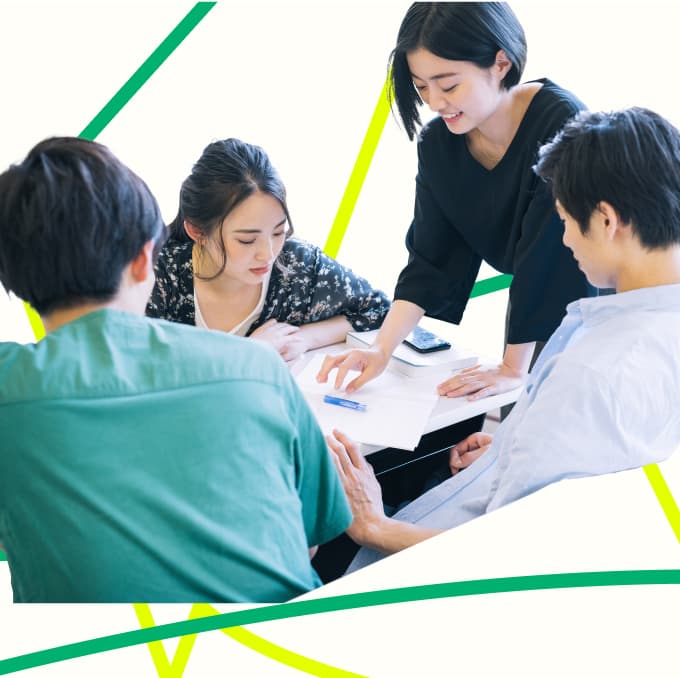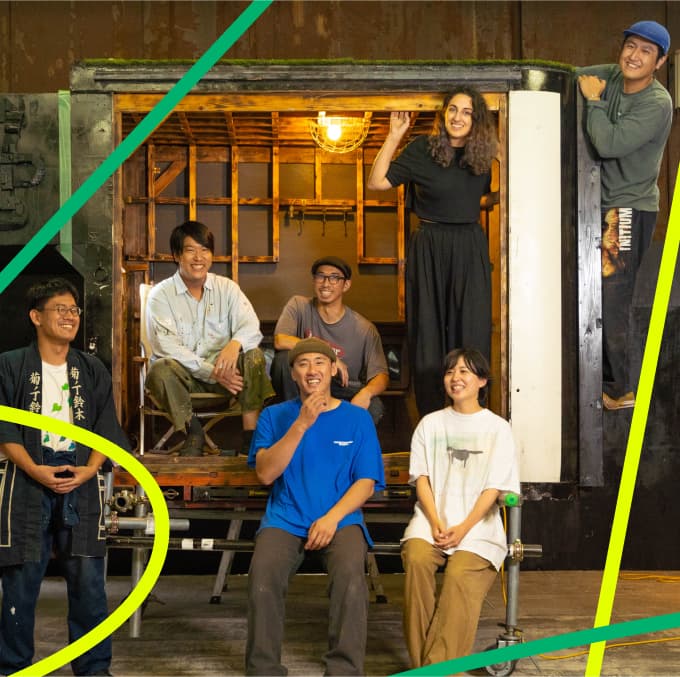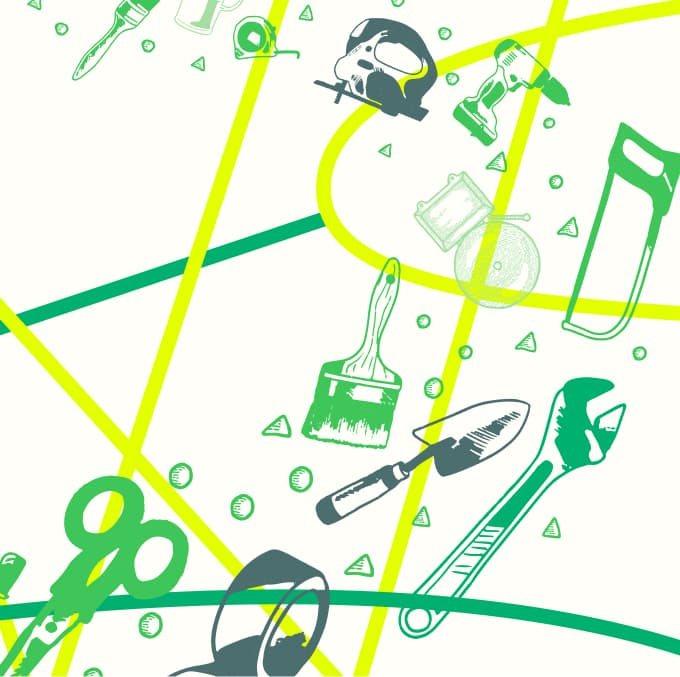[Vol.2] What Drives You? Inspirational Talks on Redesigning the Mobility Experience.
- #REDESIGN MOBILITY IDEATHON
- #INSPIRATION TALK

The DRIVE MYSELF PROJECT is a co-creation project between NISSAN and the next generation focused on creating new value in the world. An ideathon to create innovative mobility concepts was hosted in August 2023 with the aim of coming up with tangible and intangible new ideas related to mobility. Twenty-two unique members of the next generation in their teens and twenties participated alongside engineers and young employees working in advanced technology development at NISSAN.
In this article, we introduce the inspirational talks given by guest speakers during the ideathon. The guests’ experience, their talks on the theme, and the Q&A session stimulated the participants' creativity and deepened their thinking about mobility experiences.
Ory Yoshifuji, who has made it possible for people from all walks of life to move around by remotely controlling avatar robots, and Asako Tsuji, who aspires to solve social issues through creative methods, took the stage for the inspirational talks along with Toshiyuki Nakajima, who has been involved in next-generation mobility development at NISSAN, and discussed the future of mobility experiences and the driving force that motivates us.
(The Vol. 1 article introduced the content of the work done at the ideathon and the innovative mobility concepts created by each group.)
GUEST SPEAKERS


YOSHIFUJI


TSUJI


Advanced Vehicle Engineering
NAKAJIMA
INDEX
New mobility experiences created by the avatar robot cafe

The venue for the ideathon was DAWN ver.β, an "avatar robot cafe" that is putting new mobility experiences into practice. At this cafe, people who have difficulty leaving their homes can take orders and deliver drinks to customers while remotely controlling the "OriHime" & "OriHime-D" avatar robots.
Yoshifuji: Hello, my name is Ory Yoshifuji, the creator of the avatar robot cafe. Have you ever thought about what career you could have if you were bedridden? Have you ever thought about how you can participate in society like that?
Our research focuses on increasing options for all people to stay connected to society, while considering such questions as “What is mobility?”

At the avatar robot cafe, people who have difficulty going out for various reasons act as "OriHime pilots" and remotely operate the "OriHime" avatar robots at the cafe. They communicate with customers and deliver drinks to customers’ tables using the self-controlled avatar robot "OriHime-D."
Yoshifuji: The prototype of OriHime was created by my best friend who was bedridden, as a new "body" that would allow him to move around. Later, we started the avatar robot cafe as a place where people who are bedridden can work.
We are creating new mobility experiences in cooperation with people who have difficulty leaving the house due to illness and disabilities. I truly believe that there are things that can be created precisely because some things are not possible, and that what cannot be done is valuable in itself.
The mobility experience with OriHime is not limited to the avatar robot cafe. OriHime also serves as a body for those who are unable to go out, accompanying them on drives, trips abroad, and even to visit graves, creating new memories with family and friends around them.

Yoshifuji: A high school vice principal lost his physical freedom due to ALS, and he attended the graduation ceremony with OriHime. They wore a tuxedo that the student council had made for him, bowed his head to the students when he handed them their diplomas, and gave a speech in front of everyone. The students seemed to see OriHime not as a mere robot, but as their vice principal. Perhaps they were able to create new memories of the vice principal at the graduation ceremony.
What is required for a new mobility experience?
The first topic of the inspirational talks was “New Possibilities for Mobility Experiences.” We will now go discuss each session in detail.

–Mr. Nakajima, since you are involved in the evolution of technology, how do you feel about the possibilities of next-generation mobility and the future of mobility experiences?
Nakajima: Technology is constantly evolving, but I feel that it is not an end in itself. Of course, there are those who say, "I bought a car because the technology was amazing," but that is not our aim. Rather, we believe that it is more important that people's lives and livelihoods are changed by technology. Similar opinions were exchanged among the participants in the ideathon.
–Do you think that technology will keep up with people as they aim to achieve certain lifestyles?
Nakajima: Yes, for example, with the COVID-19 disaster and the spread of remote working, it is now possible to work while traveling. In this context, I think we can change our lives by viewing "mobility" as a part of our daily lives and designing mobile spaces with technology.
–Even if what we do does not change, the values of mobility and lifestyles will change with the times. Ms. Tsuji, what do you feel about the changing values of the younger generation?
Tsuji: Perhaps it is the times changing, but I have the impression that they are returning to analog. For example, vinyl records are becoming popular again around the world, and not too long ago a women's fashion magazine even had a special feature on ceramics.
However, analog does not mean giving up convenience. We want to get to our destinations quickly, and we want to make phone calls even when we are far away. I feel that while we enjoy "convenience," we also want a "tactile" feeling.

Yoshifuji: In OriHime as well, we place importance on that tactile feeling. I was once told by people around me that a video phone call would be fine, but I feel a video phone call is not good enough. The reason is that people inherently want to move around and meet someone themselves.
I think everyone has felt that Zoom meetings and video calls are not enough.
There was an opportunity recently for everyone to become residents of the metaverse world, but in the end that didn't happen, and now we are all physically gathered in one place like this. I think it is great progress for people to realize the importance of meeting in real life through traveling, going to concerts, eating together, and so on.
What drives you?
–Mobility technology has been driven by the desire to go far quickly and to see other people even if we can't meet each other. Could you tell us about your driving force?
Nakajima: My driving force is largely influenced by my experiences with cars. I have always loved the inside of a car as a private space through which I can move around. It satisfies my desire to travel to various places and my need to have my own space at the same time. With the COVID-19 pandemic, I rediscovered a sense of comfort that is completely different from the private space inside a house.
Recently, we’ve heard that young people are turning away from cars, but I want more people to know the advantages of cars, and I hope that there will be many people who will say, "My life was changed by a car. That is my driving force."
Tsuji: There are many angles to what motivates me, but the biggest for me is my sense of "why" toward society. For example, in the 1980s, the ad copy "Can you fight for twenty-four hours a day?" became popular, promoting the idea of giving your all at work. Even though the pressure is not as intense now, I feel like we are always expected to keep giving our best in our daily lives, and to be perfect without making mistakes.

Tsuji: For example, if a train is delayed even by one minute, they apologize. Even if it is not something they should apologize for, perfection is expected, and since they have apologized before, they have to keep apologizing. There are many other times when I feel a little uncomfortable, such as the shaved head controversy in high school baseball in Japan or issues related to femininity.
What I value in such situations is to keep asking the question "why?" I may seem annoying to those around me, but I believe that society will change because there are people who continue to ask why things are the way they are.
–I think that sounds fitting for Ms. Tsuji, who continues to challenge social issues. How about you, Mr. Yoshifuji?

Yoshifuji: For me, my driving force is "to get rid of loneliness." I often felt lonely as a child due to illness and having to miss school, but my mother encouraged me to enter robot contests and I met a mentor who helped me find my role in the world.
So, at the age of 17, I decided to spend the rest of my life making things in order to rid the world of the loneliness I had felt at that time. My way of life may be a bit of an exception, but compared to the universe, human life is limited to what we can do in a fraction of a second.
One cannot accomplish that much. If we decide clearly what we are going to do, we won't get lost in life, and this may be good in today's society where there are too many choices.
The mobility experience of “encounters” and “goodbyes”
The second half of the inspirational talks included a Q&A session with the project members. The participants discussed their experiences and ideas related to the theme of this year's ideathon, “How can mobility enrich our lives?”

Rainbow (pictured left) was born in 2005. Rainbow has been involved in various organizations and projects since high school and currently participates in Love Hotel innovation and event management in Shimokitazawa, Tokyo.
Rainbow: When talking as a group, it was mentioned that "encounters" and "goodbyes" may have a significant impact on the mobility experience. For example, on the way to a graduation ceremony, people think back on their memories of school. I thought it would be interesting if we could design that into the mobility experience. In order to dig deeper into the idea, we would love to hear about your "encounters" and "goodbyes" as well.
Tsuji: I recently experienced a parting with someone close to me, and the proof of that person's life is still on SNS. When I look at it from time to time, I can describe what kind of work the person did, how they spent their time, and even what clothes they wore.
But where is the "raw data" of the person? It's in my memory. I feel that what is in my mind is more proof that the person lived compared to what is written or posted online. So I think the "meaning of life" for me is to remember someone important to me…what we talked about, what we experienced together, what we left in each other's memories.
The same goes for the mobility experience. For example, rather than what you learned in class, you will remember the scenery you saw during the 10-minute break as you moved from one classroom to another, the expressions on your partner's faces, and the things you talked about together on the way to and from school. I think if we could successfully bridge "memory" and "movement" in such a way, we could design interesting mobility experiences.

Nakajima: It would be interesting if memories of people from the past were to be found in photographs and such at different locations. I believe that memories of places and encounters are linked. For example, when I visit a place where I used to work or live, I have memories of those days in my mind, but the location has somehow changed with the construction of new houses and such. I feel sad, even though I want to feel nostalgia for the passage of time.
Besides, most of the people I was with at that time are no longer in that place. But the memories of those days are still in my head. Then, when I meet up with old acquaintances in other places, the old memories come back to me. I feel the true passage of time, and then I get nostalgic.
Yoshifuji: I would like to share a story related to encounters. Ever since I was 18 years old, I have liked to wear this black lab coat and walk around with it fluttering in the wind, but those around me might think I am a pretty unusual person. People made fun of me, and once I was even questioned by the police.
There were about 50,000 students at the university I attended, and of course there were other people who didn't fit in. However, there were some people who saw me fluttering around in this black lab coat and said, "That's interesting," and I quickly made friends with them.
In other words, this unique attire is a filter for encounters I have. I think it is convenient in a way, because I rarely thought "we don't think the same way" after talking to them.
What should you do when you are lost?

Yuzu-chan (right), born in 2000, is writing a book about the COVID-19 pandemic and how it impacted guesthouses and their owners in 2020. She is making it through crowdfunding while traveling around Japan. In order to expand "detours" as a culture, she organizes the "Great Universe University" at 100BANCH, an accelerator facility by Panasonic.
Yuzu-chan: :I usually do research on "detours". I would like to ask you a question because it fits with the direction of the new mobility experience that our group is considering. I think people often empathize with detours because they have emotional benefits that are different from the benefits offered by convenience and efficiency. But it is not a theme that solves social issues, so it is difficult to make progress in research. I would like to know how to overcome such challenges.
Nakajima: I do somewhat advanced work in my company. My team comes up with a lot of ideas that we like, but most of them don't turn out to be good. Of course, there are difficulties in making a product practical, but before that, if the quality of the idea is not communicated, then the product cannot be developed.
What I often do in such situations is to force the idea into a tangible form. If you make it visible, people will react differently. Because, after all, most people can't understand things without seeing them. It is only when you actually see it for yourself that it becomes clear and that you can take action. I feel it is very important to create prototypes that are easy for anyone to understand.

Yoshifuji: The avatar robot cafe also started as a prototype; it was only in my head in 2016. When I said, "Let's make a cafe for those who can’t move," no one but my best friend agreed with me. But I really wanted to make it, so I bought some styrofoam and spent about nine hours making the prototype of OriHime-D. Then, over the next year or so, I put all of my savings into building more and more robots.
Little by little, a group of people who thought it was interesting began to form around me. My budget and friends grew, I succeeded in crowdfunding, and before I knew it, I was able to create this avatar robot cafe.
So, what I think is good for me is not something that everyone would agree with. Or rather, what everyone says is good is probably not interesting. When you think something is amazing but people don't understand it, if you just make it and share it around, I think it will get through to a lot of people.

Tsuji: I'm all for giving shape to things. For example, if you are not good at writing a proposal, try making a mood board with a collection of photos and illustrations. I pull images from various sources to convey my worldview and formulate what I want to create. Instead of focusing on the text, it is better to focus on the "emotion" that can be conveyed in a single page.
It doesn't matter if it's an unplanned mind dumping, just keep trying to give it shape. You may feel that it is not what you had in mind, but you will also come up with new ideas for the next time.
Another thing to keep in mind is that "usefulness" is not the only thing society needs. The world is full of useful and convenient things, and I feel that everything is too neat and tidy.
Therefore, I believe that the value in things that are not necessary but would be nice to have will be increasingly sought after in the future. I am really looking forward to seeing the spread of ideas and concepts that make you want to take a little detour.
Participants' impressions and summary
Here are some comments and opinions from project members about the inspirational talks.
Rainbow: The mobility concept that my group was thinking about was to design the experience of getting to a festival. It could also be related to what Mr. Yoshifuji was talking about with eliminating loneliness. I think this is an amazing experience that has moved us emotionally, since movement and mobility is an act that takes up a large part of our lives.
FUTA: I like to go for a drive late at night, but I could not verbalize why "late at night" is good for me. However, after listening to Mr. Nakajima of NISSAN, I realized that I like the atmosphere created by the two spaces inside the car (my private space) and outside the car (the night breeze) when traveling. Therefore, I believe that a mobility experience that enriches our lives comes from enriching our space.
AKITO: Ms. Tsuji mentioned "emotional things," but I also think things like messiness and irrationality are becoming very important. I, myself, am a designer with a dual focus on architecture and psychology, and I believe that human behavior is not as rational as we think. I am convinced that our irrational intuition will lead to exciting ideas and inspiration that will open up the future.

Mr. Yoshifuji's words, “what you can't do becomes valuable” seemed to resonate deeply with the participants as they pushed themselves to explore unknown possibilities.
Taking a cue from the inspirational talks’ content, each group put together their ideas for an innovative mobility experience. For the details of the final presentations, which were full of individuality, please refer to the Volume 1 article.
(Rainbow presented in Group A and Yuzu-chan presented in Group B)

YOSHIFUJI
Ory Yoshifuji is a telepresence robot inventor originally from Nara Prefecture. From 5th grade to 9th grade, he didn't attend school. Then, during high school, he invented a new mechanism for electric wheelchairs and received the Minister of Education, Culture, Sports, Science, and Technology Award at JSEC, as well as the Grand Award 3rd at Intel ISEF.
Based on his own experience during his youth, he focused on research that could "solve loneliness." He has worked on the research and development of telepresence robots aimed at alleviating loneliness since he entered Waseda University in 2009.
In 2012, he established “OryLab Inc.” and went on to develop the telepresence robot “OriHime," along with the communication device “OriHime eye+Switch,” which is designed for patients with ALS. Additionally, he opened a cafe that employs telepresence robots, which can work even if the operator is bedridden. In recognition of his work, he received the Good Design Grand Award in the 2021 Good Design Awards.
ORY YOSHIFUJI was also honored by being selected in Forbes Asia's “30 UNDER 30 ASIA.” He has also authored several books, including “Erasing Loneliness,” “Cyborg Era,” and “Weapons of the Future.”

TSUJI
Asako Tsuji is a visionary cross-border creator dedicated to promoting socially conscious creativity. Her work revolves around two fundamental pillars: "business creation with ideology and social awareness" and "work creation with a distinct worldview." With a diverse expertise spanning advertising, product development, and real events, she excels in creative direction across various genres.
In 2019, Asako launched the "Ladyknows" project, an initiative focused on women's empowerment and healthcare. She has become a prominent figure on the Japanese news program "news zero," where she offers her unique perspective as both a creator and a communicator to tackle pressing societal issues.

Advanced Vehicle Engineering
NAKAJIMA
Since childhood, Toshiyuki Nakajima has always been fascinated by the inner space of cars. His passion only intensified when he obtained his driver's license, and he was determined to work in the automotive industry.
Believing that electrification is the future, he became intensely involved in advancing vehicle electrification by developing hybrid cars and designing EV-dedicated platforms. He even pushed for the development of e-POWER—which was not in the company’s original plan—to the degree that he earned the nickname “guerrilla.”
However, as electric vehicles have become more common, he feels the need elevate the value of cars as dynamic shifts in the automotive industry continue consumers’ preferences change. The pandemic acted as a catalyst for him to rediscover the value of cars as private spaces, which is what originally spurred his childhood interest in vehicles. He is constantly driven to convey the greatness of the inner spaces of cars and wants to create vehicles that can change the world.
In this ideation session, he hopes to find new perspectives that will lead him to this goal.




